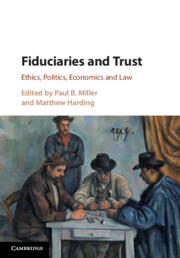Book contents
- Fiduciaries and Trust
- Fiduciaries and Trust
- Copyright page
- Dedication
- Contents
- Contributors
- Acknowledgements
- Introduction
- Part I Personal Trust and Fiduciary Relationships
- Part II Personal Trust and Fiduciary Duties
- Part III Political Trust and Fiduciary Government
- Part IV Trust and Fiduciary Law in Context
- 13 For-Profit Managers as Public Fiduciaries
- 14 Fiduciary Law and the Preservation of Trust in Business Relationships
- 15 How Much Trust Do Trusts Require?
- Index
13 - For-Profit Managers as Public Fiduciaries
A Neoclassical Republican Perspective
from Part IV - Trust and Fiduciary Law in Context
Published online by Cambridge University Press: 13 March 2020
- Fiduciaries and Trust
- Fiduciaries and Trust
- Copyright page
- Dedication
- Contents
- Contributors
- Acknowledgements
- Introduction
- Part I Personal Trust and Fiduciary Relationships
- Part II Personal Trust and Fiduciary Duties
- Part III Political Trust and Fiduciary Government
- Part IV Trust and Fiduciary Law in Context
- 13 For-Profit Managers as Public Fiduciaries
- 14 Fiduciary Law and the Preservation of Trust in Business Relationships
- 15 How Much Trust Do Trusts Require?
- Index
Summary
This chapter examines the fiduciary duties of for-profit managers in modern liberal society. To arrive at the right “mix” of these duties, it compares the fiduciary duties implied by a standard descriptive model of our society with two competing normative models: Lockean libertarianism on the “right” and neo-classical republicanism on the “left.” This comparison shows that all three versions of liberalism, even the one with a Lockean night-watchman state, require far more extensive duties than we now expect, including a professionalization of management itself. And it shows that the version of liberalism with the most expansive state, neo-classical republicanism, requires the most appealing set of for-profit fiduciary duties. More basically, it concludes that what makes this latter set most appealing is that we ourselves are evaluating it from the perspective it recommends for for-profit managers: What is best, by our own best lights, for society as a whole.
- Type
- Chapter
- Information
- Fiduciaries and TrustEthics, Politics, Economics and Law, pp. 275 - 301Publisher: Cambridge University PressPrint publication year: 2020

